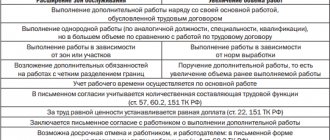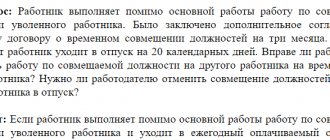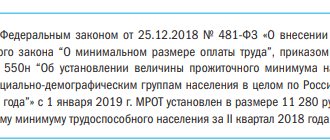Features of the work of part-time workers
Combination work is always allocated time free from the main job (Article 282 of the Labor Code of the Russian Federation). In this case, it does not matter at all which employer the part-time worker additionally works for: the one giving him the main job or another.
Since the main job, as a rule, requires full-time work, part-time work is prohibited from devoting more than half of the monthly work time (Article 284 of the Labor Code of the Russian Federation). If a part-time worker performs his job duties daily, then he cannot work more than 4 hours a day.
A reduction in the norm of labor time leads to a corresponding reduction in pay for a part-time worker (Article 285 of the Labor Code of the Russian Federation), but does not eliminate the need to apply a regional coefficient to accruals if it operates in the region.
Payments to part-time workers
Part-time work is a type of work outside of normal working hours, that is, 40 hours a week. In accordance with the new edition of the Labor Code, from October 6, 2007, it should not exceed 4 hours a day and half the monthly working time standard.
You can work part-time with an unlimited number of employers, but taking into account the above norm. For example, a part-time worker may work 20 hours a week for one employer, another 10 hours for a second, another 10 hours for a third, etc. On days when an employee is free from work duties at his main job, he can work part-time full time.
You can work part-time either in your own company or in another enterprise. Depending on this, part-time work can be internal or external.
How to register a part-time worker
An employment contract is concluded with an employee who has entered a part-time job. It must indicate that the job is a part-time job.
To work part-time, you do not need the consent of the manager from your main place of work. True, the employer may ask the employee to notify him of his main job.
The exception is company managers. They are required to obtain permission from the owner of the company's property or its authorized body (for example, the board of directors). This is provided for in Article 276 of the Labor Code.
When hired for a part-time job in another company (external part-time job), the employee is required to present a passport (or other identification document) to the employer. But the employer has no right to demand:
- work book (extract from it);
- military registration documents;
- other documents required to be presented at the main place of work.
The exception is work that requires special knowledge. Then the employee may be asked to present a diploma of education (vocational training) or a certified copy thereof. This, for example, is necessary when hiring a teacher to an educational institution, a doctor to a medical clinic, etc. In addition, when applying for a job with harmful or dangerous working conditions, a certificate is required about the nature and working conditions at the main place of work.
Entries in the work book about part-time work are made only at the request of the employee.
Salary
Part-time workers are paid in the same manner as other employees of the company, that is, depending on the time worked or output.
Please note: if you set a full salary for a part-time worker, you will violate the provisions of Article 132 of the Labor Code - providing employees with equal pay for equal work.
Example
At Zarya LLC, the staffing table provides for the position of a plumber with a salary of 10,000 rubles. A neighboring employee, Ivanov, decided to get a part-time job at Zarya.
For a full month of work, Zarya’s accountant accrued Ivanov’s salary in the amount of 5,000 rubles. (RUB 10,000 x 1/2).
If Ivanov worked part-time for 3 hours every day, his salary would be 3,750 rubles. per month (RUB 10,000: 8 hours x 3 hours).
If a part-time worker works in an area where regional bonuses and coefficients are established, they must also be taken into account when calculating wages. In addition, a clause on personal allowances or other incentive payments can be included in the part-time worker’s employment contract.
Standard tax deductions are provided to internal part-time workers taking into account their total earnings received at a given enterprise. For example, if an employee’s salary in his main job was 18,000 rubles from the beginning of the year, and in his part-time job - 3,000 rubles, then he is not entitled to a deduction in the amount of 400 rubles. After all, his total income in this case is more than 20,000 rubles (18,000 + 3000).
The earnings of external part-time workers are not taken into account for standard deductions.
Unified social tax, pension contributions and “injury” contributions are charged on the salaries of part-time workers. They do this in a general manner.
In addition to wages, part-time workers are provided with the same guarantees and compensations as main employees, with the exception of “educational” and “northern” benefits (Article 287 of the Labor Code of the Russian Federation).
Vacations
Part-time workers have the right to annual paid leave and additional leaves. Moreover, they are granted vacation simultaneously with vacation from their main job. The basis may be a certificate from the “main” company about the time of annual paid leave. If the six months required by law have not yet expired from the start of part-time work, the employee is granted leave in advance.
Paid leave at a part-time job may be shorter than at the main job. In this case, at the request of the employee, he must be granted leave without pay.
Please note: those working in the Far North are granted extended leave only at their main job.
If a part-time worker has not used his next annual leave, he has the right to receive compensation for it upon dismissal. The amount of vacation pay and compensation for part-time workers is calculated in the same way as for main employees.
Business trips
The law guarantees all employees traveling on business trips:
- maintaining a job;
- payment of average earnings;
- compensation for travel and accommodation costs;
- daily allowance payment.
There are no special rules or restrictions for seconded part-time workers. And yet they exist. Since, leaving one job, a part-time worker cannot perform official duties in another position.
So, when sending a part-time worker on a business trip, the company must pay him the average salary for the time he is on the trip. At the same time, at the second job, the employee must take leave at his own expense for the period of the business trip. And it doesn’t matter whether it’s your main job or a part-time job.
An employee can be sent to the same area simultaneously for two places of work - the main one and the additional one. In this case, the average salary must be paid for both positions, since the employee will perform his official duties on a business trip.
But travel expenses - travel passes, daily allowances, hotel allowances and others - need to be reimbursed to the employee only once. Therefore, sending organizations must agree on the distribution of these costs among themselves. This procedure is provided for in paragraph 9 of the Instruction of the Ministry of Finance of the USSR, the State Committee for Labor of the USSR and the All-Union Central Council of Trade Unions dated April 7, 1988 No. 62.
Sick leave payment
The Labor Code guarantees part-time workers payment of benefits for illness, pregnancy and childbirth. But unlike other compensations, it is very difficult to implement this guarantee in practice, and here’s why.
According to Article 183 of the Labor Code, the procedure for paying benefits must be established by federal law. Judging by the title, there is such a document - this is the law of December 22, 2005 No. 180-FZ “On certain issues of calculation and payment of benefits for temporary disability, pregnancy and childbirth.” Article 2 of this law states that such benefits “are calculated from the average salary of the insured person paid to him by the employer paying these benefits for the last 12 months...”.
At the same time, there is not a word in the law about part-time workers. And if so, then you need to be guided by the regulations adopted before the Labor Code came into force, to the extent that does not contradict it. Such a document is the “Regulations on the procedure for providing benefits for state social insurance”, approved by Resolution of the Presidium of the All-Union Central Council of Trade Unions dated November 12, 1984 No. 13-6.
Clause 68 of the Regulations states: “The actual earnings from which benefits are calculated take into account all types of wages for which... social insurance contributions are calculated... with the exception of payments specified in clause 69.” Among the exceptions mentioned is payment for part-time work. However, this restriction contradicts the Labor Code and therefore cannot be applied. Thus, it turns out that when paying sick leave, the entire employee’s earnings must be taken into account, including part-time work.
So, in theory, the problem is solved. But how to implement it in practice? After all, among other things, the accountant is obliged to follow the Federal Law of November 21, 1996 “On Accounting”. Article 9 of the law requires documentation of business transactions. But sick leave is issued in one copy. Therefore, an employee can confirm the fact and duration of incapacity for work only at one place of work.
If this is an internal part-time worker, then he receives salary for both positions from one employer. This means that a sick leave certificate will be quite enough to confirm his inability to work at two jobs at once. And if so, then the part-time worker needs to accrue benefits based on total earnings. The Social Insurance Fund of Russia also agrees with this (letter dated January 23, 2006 No. 02-18/07-541).
External part-time workers were less fortunate. Despite the fact that these workers have the same rights as internal part-time workers, they cannot count on benefits in full. The fact is that they simply have nothing to document the fact of incapacity for work at their second job. Since the law does not recognize copies of sick leave. Thus, there is discrimination against external part-time workers. It can only be ended by passing a law regulating the procedure for paying benefits to part-time workers.
Note that an employee can receive benefits at any place of work of his choice, and not just at the “main” company, as the Social Insurance Fund believes. After all, if the salary at the part-time job is higher than at the main job, then it is more profitable for the employee to receive benefits there. But keep in mind: if you pay sick leave to an external part-time worker, you must be prepared for a dispute with the Social Insurance Fund, which refers to paragraph 100 of Resolution of the All-Russian Central Council of Trade Unions No. 13-6. According to this paragraph, “benefits are assigned at the place of work of the worker or employee (where his work record book is located).” At the same time, officials are not embarrassed that this provision contradicts the Labor Code, and, therefore, it should not be applied.
Dismissal of a part-time worker
You can fire a part-time employee according to the same rules as a full-time employee. But there is also a specific reason for dismissal - hiring an employee for the same position who will work on a permanent basis. Please note: the employee must be notified in writing two weeks before the proposed dismissal. This is stated in Article 288 of the Labor Code. The entry in the work book looks like this: “Dismissed due to the hiring of an employee on a permanent basis, Article 288 of the Labor Code of the Russian Federation.”
for reference
If an employee quits his main job, the part-time job does not automatically become his main job. A part-time worker does not have the right to demand that the employer transfer him from part-time job to main employee.
N. Rudenkova, editor-expert of the berator “Employees and You”
How to determine the minimum wage for a part-time worker
The minimum wage established at the legislative level (minimum wage) corresponds to the limit below which the salary of an employee who has worked a full month and fulfilled his job duties (labor standard) in full cannot fall (Article 133 of the Labor Code of the Russian Federation).
However, a part-time worker is prohibited from working beyond half the normal monthly work time: for him, the maximum possible value of the minimum income will be half the minimum wage in force in the region of work.
If the working time of a part-time worker is less than half the monthly norm, then the legally established minimum of his earnings will be determined not by ½, but by another coefficient reflecting the real norm of working time during the month.
This means that the minimum wage applied to a part-time worker will always be a calculated value, which is the product of the value of the minimum wage in force in the region and a coefficient reflecting the share of the real workload of a part-time worker in comparison with the full monthly labor standard.
To determine whether a part-time worker will need an additional payment up to the minimum wage calculated for him, you need to compare the accruals made from the salary or tariff rate (for work performed) with this amount. Payments for the conditions in which labor is carried out are not included in the compared amount.
Is it permissible to pay a full salary?
There is no consensus on the issue of the admissibility of calculating a full salary when working part-time. There are two opposing points of view, which are as follows:
- Payment of full salary to a part-time worker is unacceptable.
Some experts explain this opinion by the fact that, by law, a part-time worker cannot work more than 4 hours a day. The final amount of his salary is determined in proportion to the time worked. At the same time, Art. 22 of the Labor Code of the Russian Federation provides that the employer must provide employees with equal pay for work of equal value.
Thus, paying a part-time employee remuneration in the amount of the full salary (on the same basis as the main employees) can be regarded as discrimination against employees in the distribution of wages.
- The employer can provide a part-time worker with a full salary.
Supporters of this point of view point to the provisions of Art. 285 of the Labor Code of the Russian Federation, which clearly states that the management of an organization can establish remuneration for part-time workers not only in proportion to the time worked, but also on other conditions. Thus, the wages of this category of workers can not only be equal to the full salary, but even exceed it.
Which system is better to choose?
In order not to encounter controversial situations, as well as not to violate labor law norms, employers should choose a remuneration system that will not raise any questions. It could be:
- Payment of remuneration is proportional to the time the part-time worker worked.
In this case, it will not be possible to set the full salary. However, if the employer still intends to pay the part-time worker more, then you can choose another system (next point),
- Salary depending on output.
In this case, the specific amount may depend on sales volume, number of units produced, etc. Thus, with such a remuneration system, the salary of a part-time worker is not limited in any way, but depends entirely on his level as a professional.
We prepare and take into account the additional payment to the part-time worker
If a part-time worker requires additional payment, an order for such additional payment is issued. When employees’ salaries are low, and the situation with additional payments to the minimum wage arises often, the order may be general in nature and apply not to a specific case, but to all similar situations. In this case, comparison with the minimum wage when calculating wages will be carried out monthly.
For each additional payment, it is necessary to make a calculation of its value, documenting this calculation in the form of a document that can subsequently be presented for verification.
The additional payment up to the minimum wage is taken into account as part of labor costs and, as part of the payment for labor, reduces the income tax base (Letter of the Federal Tax Service of the Russian Federation dated August 31, 2010 No. ШС-37-3/10304).
Let's sum it up
- Accounting for part-time work is subject to special rules, since this work is carried out outside the time allocated to the main job. The norm of monthly working time for part-time work cannot exceed half of the norm of working time for a full month. For part-time workers, wages are also reduced in appropriate proportions.
- The minimum wage established by law reflects the minimum payment for labor due to an employee for a month fully worked by him with a fully fulfilled standard of work. But for a part-time worker, who is given the opportunity to work no more than half of this norm, the minimum wage is reduced by applying a coefficient to it that takes into account the share of real time allocated to the part-time worker for work during the month.
- The amount of additional payment up to the minimum wage is determined by the difference between the value of this indicator calculated for a specific employee and the wage accruals made to him. The need for additional payment is documented by order. The amounts of additional accruals are included in labor costs and reduce the income tax base.








